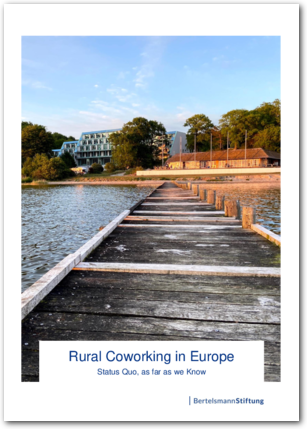It was right at the start of the pandemic when we published our trend study on rural coworking in Germany. The results met with great interest at home and abroad. Since it felt like the whole world was in lockdown and searching for new places to work, the desire to learn more about how coworking was developing in European countries emerged rapidly.
For this reason, we invited rural coworking experts from all over Europe to join us in compiling an overview of the situation in the different European countries. In May 2021 experts from Czech Republic, Germany, Greece, Hungary, Italy, Norway, Poland, Portugal, Slovenia, Spain and Switzerland met in a virtual meeting and shared their experiences, with the aim to learn from each other and to stimulate coworking initiatives in further regions.
German trend study as starting point
Background and basis for the meeting were the results of the German trend study which had been undertaken on behalf of the Bertelsmann Stiftung by Coworkland eG with the support of Netzwerk Zukunftsorte (Rural Coworking – People, Models, Trends) published in winter 2020. This publication offered a detailed insight into the typologies of users, founders, and business models of new places of work in rural areas in Germany and served as a blueprint for compiling the findings from the other countries.
11 countries – 11 Reports
Besides substantive presentations of eleven countries, many contacts and ideas have been shared during that event. We learned about creative and innovative projects showing the great diversity of the field and fascination variety of responses to upcoming challenges. And on the other side, we were struck by the remarkable similarity of values of inclusion and sustainability we all share in the participating European initiatives.
One aspect was discussed intensively: The question of the business model of rural Coworking initiatives. There were different approaches on this. Some initiatives relied on public funding schemes from the very beginning. Others concentrated more on private support. But what they all had in common, were the strong belief that in rural areas, Coworking operated as a pure business case, will hardly succeed. From Switzerland finally came the compelling approach, to think rural coworking more like a social enterprise. There was agreement that this approach is worth further investigation and refinement.
Three learnings of the meeting
- Rural coworking cannot be developed as a classical business model but needs to be adapted to the local challenges within the specific region.
- Rural coworking should not be seen as a pure business case. It should be viewed more as a social enterprise.
- Peer learning opportunities like this event are essential for the emerging sector and should be continued.
The deep insights of the European rural coworking community represented in this meeting are the basis of the publication “Rural Coworking in Europe” (Tobias Kremkau, Alexandra Schmied, Johanna Voll) published in late 2021. Here you will find a brief overview of the similarities and differences we observed, some first learnings and of course the country reports we received.
We thank all participants for their contributions and sharing openly about the status quo of rural coworking in their countries and regions.
A special thanks goes to Tobias Kremkau and Johanna Voll whose substantial contributions made the publication possible. Tobias serves as a consultant and development officer at CoWorkLand eG. He is an acknowledged expert to the field one of the co-founders of the German Coworking Federation e.V. (GCF). Johanna is one of the co-founders of the Coworking Library. She has taught and researched the subject of the reorganisation of work at the European University Viadrina. As board member of the German Coworking Federation e.V. as well as of the European Coworking Assembly, she connects researchers and organises (virtual) events. She is the Global Head of Operations at included.co and a coworking space in an old brewery in Halle.
Download here

475 mal gelesen




